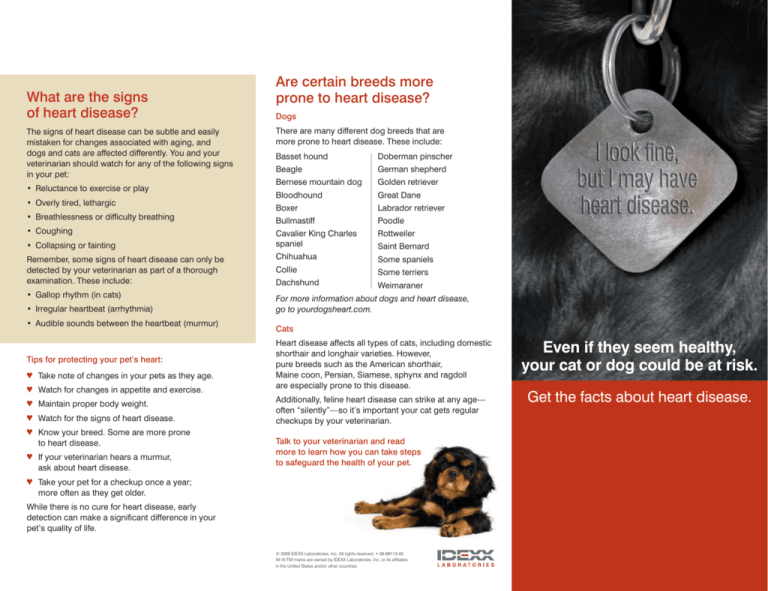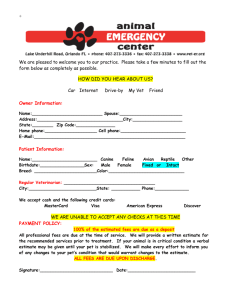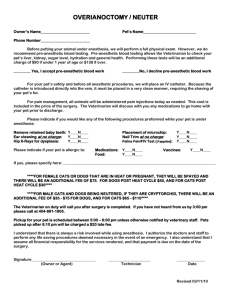
What are the signs
of heart disease?
The signs of heart disease can be subtle and easily
mistaken for changes associated with aging, and
dogs and cats are affected differently. You and your
veterinarian should watch for any of the following signs
in your pet:
Are certain breeds more
prone to heart disease?
Dogs
There are many different dog breeds that are
more prone to heart disease. These include:
Basset hound
Doberman pinscher
Beagle
German shepherd
Bernese mountain dog
Golden retriever
Bloodhound
Great Dane
Boxer
Labrador retriever
Bullmastiff
Poodle
Cavalier King Charles
spaniel
Rottweiler
Remember, some signs of heart disease can only be
detected by your veterinarian as part of a thorough
examination. These include:
Chihuahua
Some spaniels
Collie
Some terriers
Dachshund
• Gallop rhythm (in cats)
Weimaraner
For more information about dogs and heart disease,
go to yourdogsheart.com.
• Reluctance to exercise or play
• Overly tired, lethargic
• Breathlessness or difficulty breathing
• Coughing
• Collapsing or fainting
• Irregular heartbeat (arrhythmia)
• Audible sounds between the heartbeat (murmur)
Tips for protecting your pet’s heart:
♥ Take note of changes in your pets as they age.
♥ Watch for changes in appetite and exercise.
♥ Maintain proper body weight.
♥ Watch for the signs of heart disease.
♥Know your breed. Some are more prone
to heart disease.
♥ If your veterinarian hears a murmur,
ask about heart disease.
Saint Bernard
Cats
Heart disease affects all types of cats, including domestic
shorthair and longhair varieties. However,
pure breeds such as the American shorthair,
Maine coon, Persian, Siamese, sphynx and ragdoll
are especially prone to this disease.
Additionally, feline heart disease can strike at any age—
often “silently”—so it’s important your cat gets regular
checkups by your veterinarian.
Talk to your veterinarian and read
more to learn how you can take steps
to safeguard the health of your pet.
♥Take your pet for a checkup once a year;
more often as they get older.
While there is no cure for heart disease, early
detection can make a significant difference in your
pet’s quality of life.
© 2009 IDEXX Laboratories, Inc. All rights reserved. • 09-69113-00
All ®/TM marks are owned by IDEXX Laboratories, Inc. or its affiliates
in the United States and/or other countries.
Even if they seem healthy,
your cat or dog could be at risk.
Get the facts about heart disease.
Is heart disease common
in cats and dogs?
It is. Consider the facts:
How does heart disease
affect pets?
How is a heart problem
diagnosed?
Cats and dogs are most commonly diagnosed
with one of three cardiac conditions:
Mitral valve disease
The most common type of
heart disease in dogs, an
important valve becomes
leaky and allows blood to
flow through the heart in the
wrong direction.
For dogs
• Up to 15% of younger dogs have heart disease.1,2
• The risk of heart disease increases dramatically with
age; 60% of aged dogs may have heart disease.1,2
For cats
• Heart disease is often a “silent” disease in cats and,
therefore, may go undiagnosed until it’s too late.
• Because it often goes undiagnosed, the rate of heart
disease in cats is unknown. However, heart disease
may be present in up to 15% of cats.3
Adding greater urgency to the statistics is that, until
recently, heart disease has been very difficult to
diagnose for dogs and cats.
Dilated cardiomyopathy
Also common in dogs, the
heart’s muscle becomes
stretched and weak, reducing
the heart’s effectiveness to
pump blood.
Hypertrophic cardiomyopathy
More common in cats, this
disease is characterized
by thickening of the heart’s
muscle, making it an
ineffective pump.
Blood
backflow
through
valve
Enlarged
spherical
chambers
Thin/weak
heart walls
Thick
heart walls
Talk to your veterinarian
Whichever type of heart disease affects a pet,
if undiagnosed or left untreated, the disease may
eventually result in heart failure. Ask your veterinarian
if your pet is at risk for heart disease, and tell them
if you believe your pet has any of the symptoms
described in this brochure. With early diagnosis,
your cat or dog can live a healthier life.
1. Edmonton MH. School of veterinary medicine offers cardiology services. LSU Today. 2002;18(40).
2. Rush JE. Chronic valvular heart disease in dogs. Proceedings from: 26th Annual Waltham Diets/OSU Symposium for the
Treatment of Small Animal Cardiology; October 19–20, 2002.
3. Paige CF, Abbott JA, Pyle RL, Elvinger F. Prevalence of cardiomyopathy in apparently healthy cats [ACVIM Abstract 241].
J Vet Intern Med. 2006:20(3):776.
A thorough physical examination
and listening to your pet’s heart
with a stethoscope will provide
your veterinarian with clues
as to whether your pet has
any heart-related problems.
Additionally, it’s important
to take your pet to the veterinarian regularly, as early
diagnosis and treatment will help your pet lead a
happier, healthier and longer life.
A breakthrough in veterinary testing
By measuring the presence of the same cardiac
marker that indicates heart disease in humans,
the Cardiopet™ proBNP Test gives veterinarians a
revolutionary new way to diagnose heart disease in
cats and dogs. And this simple, affordable blood test
provides results in just 24 hours.
Additional tests
Based on your pet’s examination and test results,
your veterinarian may also recommend other more
involved tests. These might include x-rays, an
electrocardiograph (ECG) and an
echocardiogram (an ultrasound
evaluation of your pet’s heart).







